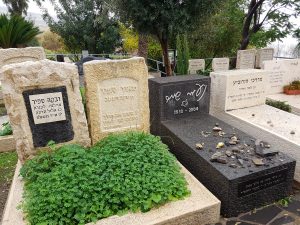Naomi Shemer
Naomi Shemer (Hebrew: נעמי שמר; July 13, 1930 – June 26, 2004) was a leading Israeli musician and songwriter, hailed as the "first lady of Israeli song and poetry. Her song "Yerushalayim Shel Zahav" ("Jerusalem of Gold"), written in 1967, became an unofficial second anthem after Israel won the Six-Day War that year and reunited Jerusalem.
Naomi Sapir was born to Rivka and Meir Sapir (Sapirov) in Kvutzat Kinneret, an Israeli kibbutz her parents had helped found, on the shores of the Sea of Galilee. In the 1950s she served in the Israeli Defense Force's Nahal entertainment troupe, and studied music at the Rubin Academy in Jerusalem, and in Tel Aviv with Paul Ben-Haim, Abel Ehrlich, Ilona Vincze-Kraus and Josef Tal.
Shemer did her own songwriting and composing, set famous poems to music, such as those of the Israeli poet, Rachel, and the American Walt Whitman. She also translated and adapted popular songs into Hebrew, such as the Beatles song "Let It Be" in 1973.
In 1963, she composed "Hurshat Ha'Eucalyptus" ("The Eucalyptus Grove"), a song that evokes Kvutzat Kinneret where she was born.It was covered in a recent version by Ishtar. In 1967, she wrote the patriotic song, "Yerushalayim Shel Zahav" (Jerusalem of Gold), which was sung by Shuli Natan and became famous. She wrote it for the Israeli Music Festival. After Israel's victory in the Six-Day War that year, she added another verse celebrating the reunification of Jerusalem. The song "gained the status of an informal second national anthem."
She first married actor Gideon Shemer and had a daughter, Lali. They were later divorced. She later married an attorney, Mordechai Horowitz. The two had a son Ariel Horowitz, who also became a musician.
Shemer continued to write her own songs. She died in 2004 of cancer, aged 73. Shortly before her death, she wrote to a friend, saying she had used a Basque folk melody as the basis for her 1967 "anthem," "Jerusalem of Gold". She had always denied it before. The friend and her family decided to publish the account. In 1962, singer Paco Ibáñez performed the Basque melody "Pello Joxepe" (Joseph The Fool), in Israel, when Shemer might have heard it.
Shemer was buried in the cemetery at Kvutzat Kinneret, her place of birth. Alongside her are buried many of the socialist ideologues and pioneers of the second and third waves of immigration. Shemer was buried near the famous Israeli poet Rachel, according to Shemer's wish.
In 1983, Shemer received the Israel Prize for Hebrew song (words and melody).
From: Wikipedia.
On the day of her funeral, Israeli Prime Minister Ariel Sharon paid tribute to her with these moving words:
"Between grass and stone, the whisper of the eucalyptus and the smell of salt, Naomi Shemer is brought to rest on the shores of the Sea of Galilee. Naomi's love of the Land of Israel, its nature, its landscapes and its people was great. She knew the flora and fauna, the permanent and the temporary, the old and the transient. With wonderful lyrics and melodies she succeeded in connecting us to our roots, our sources and the beginning of Zionism; and stirred us with true love for our origins.
Naomi introduced us to the almond blossom, the snow-white lily, the orchard vine and the field of clover; with gracious wooing, playfulness and refinement; with love, the loveliness of summer, the colors of the fall and the khamsin in the army post; with the soldiers' fatigue and the four brothers; with longing for culture, values and peace, the scent of the desert, the glory of the craters, the long grueling nights; with the darkness and the reddish fog; with the rustle of the wind, the beach and the sea; with the Dome of the Rock, the dirt roads and the white city; with the pine trees of Jerusalem, its clear mountain air and her longing for its safety; with a broken heart - as we're both from the same village - from the same village, the flesh of our flesh, the bone of our bones, a part of our soul.
All these we met in her songs and in her. Naomi sang to them and about them with tenderness and love, and perpetuated the beauty of the land and its great antiquity, in word and music; and sealed them in our minds with a burning kiss. Her wonderful Hebrew, her immense and blessed talent, her great love, and her vision and grace, have become a national and cultural asset, both for us and the State of Israel. Today as we say goodbye to Naomi Shemer, we bow our heads in grief at her passing, but are grateful for the wonderful gift she has given us. May her memory be blessed."
To the words of the Prime Minister's funeral oration, Shimon Peres added in his impressive and unique style: "Few people have united the entire nation in admiration of their personality, of the awesomeness of their work - and in sorrow at their passing. Naomi Shemer taught us to sing, to mourn and rejoice together, as a people and as individuals. As the poetess Rachel, she also came to us from the Kinneret, as clear as its waters, as profound as its depth, and its overall beauty. We mourn, but are grateful at the same time."
Translated from: The Mideast Forum



